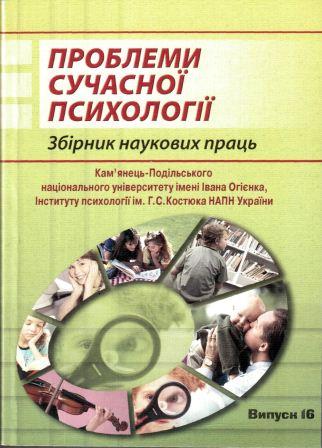Феноменологічний аспект вивчення особистісної амбівалентності у студентів юнацького віку
DOI:
https://doi.org/10.32626/2227-6246.2012-16.%25pКлючові слова:
амбівалентність, феномен, феноменологічне інтерв’ю, динаміка амбівалентності, фон_спокій, дезорієнтація, дослідження ситуації і власних можливостей, вирішення_вибір і зміни.Анотація
Феноменологічним шляхом вивчаються етапи розвитку розуміння
особистісної амбівалентності у студентів юнацького віку: фонспокій,
дезорієнтація, дослідження та вирішення.
Посилання
Большой толковый психологический словарь: в 2т. /[сост. Ре
бер А.]. – М.: ООО Издво АСТ; Вече, 2003. – Т.2. (ПЯ). – 560 с.
Зелінська Т.М.Амбівалентність особистості: Теорія, діагно
стика і психокорекція:[навч. посібн.]/ Тетяна Миколаївна
Зелінська.– К.: Каравела, 2010. – 256 с.
Donaldson S., Westerman N. Development of children’s under
standing of ambivalence and casual theories of emotions //Devel
opmental Psychology. – 1986. – Vol. 26. – № 5. – P. 635662.
Harrist S. A phenomenological investigation of the experience of
ambivalence. Journal of Phenomenological Psychology. – 2006. –
№37 (1).– P.85114.
Harter S. Cognitivedevelopmental processes in the integration of
concepts about emotions and self // Social Cognition. – 1986. –
Vol. 4. – P.119151.
Krugman M. A sociometric study of ambivalence in decisionmak
ing: Doctor of Philosophy in Psychology dissertation.–The Uni
versity of Connecticut, 1986.–130 p.
Smelser, N. J. The rational and the ambivalent in the social sci
ences: Presidential address. American Sociological Review. –
– P. 116.
Thompson M., Zanna M. The conflicted individual: personalitybased
and domainspecific antecedents of ambivalent social attitudes //Jour
nal of Personality. – 1995. – Vol.63. – №2. – P.259288.
##submission.downloads##
Як цитувати
Номер
Розділ
Ліцензія
Редакція має повне право публікувати у Збірнику оригінальні наукові статті як результати теоретичних і експериментальних досліджень, які не знаходяться на розгляді для опублікування в інших виданнях. Автор передає редколегії Збірника права на розповсюдження електронної версії статті, а також електронної версії англомовного перекладу статті (для статей українською та російською мовою) через будь-які електронні засоби (розміщення на офіційному web-сайті Збірника, в електронних базах даних, репозитаріях та ін).
Автор публікації зберігає за собою право без узгодження з редколегією та засновниками використовувати матеріали статті: а) частково чи повністю в освітніх цілях; б) для написання власних дисертацій; в) для підготовки абстрактів, доповідей конференцій та презентацій.
Автор публікації має право розміщувати електронні копії статті (у тому числі кінцеву електронну версію, завантажену з офіційного web-сайту Збірника) на:
- персональних web-ресурсах усіх Авторів (web-сайти, web-сторінки, блоги тощо);
- web-ресурсах установ, де працюють Автори (включно з електронними інституційними репозитаріями);
- некомерційних web-ресурсах відкритого доступу (наприклад, arXiv.org).
Але в усіх випадках обов’язковою є наявність бібліографічного посилання на статтю або гіперпосилання на її електронну копію, що містяться на офіційному сайті Збірника.






